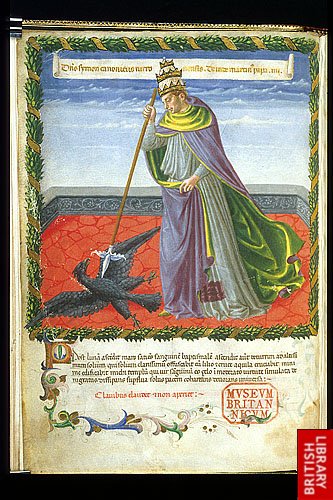 was born Simon de Brie in the second decade of the thirteenth century to the noble family of Jean de Brie at the château of Meinpincien, Île-de-France, France.
He first studied at the University of Paris and then went on to study law at Bologna and Padua. Like many sons of the nobility at that time,
he entered the church as a priest and received a benefice at Rouen,
and soon was appointed canon and treasurer of St Martin's at Tours. King Louis IX named him Chancellor of France and keeper of the Great Seal in 1260.
Pope Urban IV made him a cardinal in 1261 and he served as a papal legate to the French court under Urban IV, Clement IV and Gregory X.
Simon became active in the church and he presided over several reform synods, the most important being held at Bourges in September, 1276.
It was during this period Simon became heavily involved in the negotiations for the papacy to turn over the Kingdom of Sicily to Charles of Anjou.
was born Simon de Brie in the second decade of the thirteenth century to the noble family of Jean de Brie at the château of Meinpincien, Île-de-France, France.
He first studied at the University of Paris and then went on to study law at Bologna and Padua. Like many sons of the nobility at that time,
he entered the church as a priest and received a benefice at Rouen,
and soon was appointed canon and treasurer of St Martin's at Tours. King Louis IX named him Chancellor of France and keeper of the Great Seal in 1260.
Pope Urban IV made him a cardinal in 1261 and he served as a papal legate to the French court under Urban IV, Clement IV and Gregory X.
Simon became active in the church and he presided over several reform synods, the most important being held at Bourges in September, 1276.
It was during this period Simon became heavily involved in the negotiations for the papacy to turn over the Kingdom of Sicily to Charles of Anjou.
Pope Nicolas III died in 1280 and after six months of bickering by the cardinals over the election, Charles of Anjou saw his chance to put his man in the Vatican. Charles went to Viterbo where he threw two cardinals in jail and threatened the rest. Simon de Brie was elected Martin IV on February 22, 1281, but was not immediately crowned. Anti-French riots over Charles’s actions had broken out in Rome and the town of Viterbo was under interdict for the same reason. Simon was not crowned Martin IV until March 23rd at Orvieto.
Martin IV immediately did Charles’s bidding by appointing him Roman Senator. At the urging of Charles of Anjou, he dissolved the union between the Greek and the Latin churches established at the Council of Lyons in 1274 by excommunicating the Byzantine emperor, Michael Palaeologus. Martin soon became an active participant in Charles’s plans to invaded Byzantium.
The revolt in Sicily in 1282 apparently took Martin IV by surprise as much as it did Charles of Anjou. The people of Palermo initially asked to be placed under the protection of the papacy, but Martin IV's insistence that Sicily return to Angevin rule assured the involvement of Peter III and the Crown of Aragon. In May 1282 he excommunicated the entire population and on March 21, 1283 Pope Martin IV declared all of the lands of Peter III forfeit, having already excommunicated him. Charles of Anjou and Martin IV would use this as a pretext to call a crusade against Peter III. He would give up much of the church's authority and treasure to Phillip III of France in his efforts to garner Phillip's support.
Pope Martin IV would not live to see to see his crusade or its disaterous results. He died at Perugia on March 28, 1285 after fleeing Rome to avoid riots directed against him. His support of Charles of Anjou to the detriment of the church and his refusal to consider alternatives to Angevin rule in Sicily assured the intervention of the Crown of Aragon and the start of a bloody war that would fester for twenty years. Dante, in his Divine Comedy, would later place Martin IV in Purgatory for being a glutton of Vernaccia wine and eels from Lake Bolsena.
The 15th century miniature of Martin IV courtesey of the British Library. Copyright © The British Library Board: Harley 1340 f. 1v.

